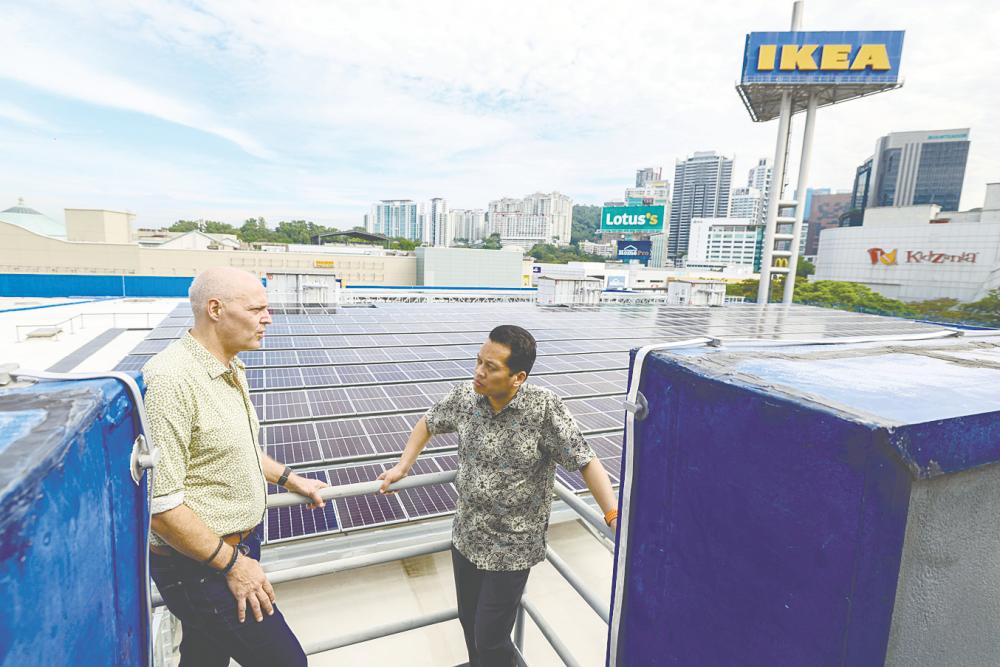PETALING JAYA: The government will ensure that Malaysia’s solar industry remains competitive amid the United States’ proposal to impose new duties on solar product imports from Southeast Asia, said Natural Resources and Environmental Sustainability Minister Nik Nazmi Nik Ahmad.
He disclosed that the issue falls under the purview of the Ministry of Investment, Trade and Industry (Miti) which has already launched an investigation.
“Malaysia is one of the producers. We have investors from various countries, including America, China and other countries that are involved in solar production in our country. We trust Miti will present the best case (in trade discussion) to ensure Malaysia’s solar industry remains competitive,” he told reporters at the ‘Tops It Off With Solar’ event in conjunction with World Earth Day at IKEA Damansara today.
Nik Nazmi acknowledged that rising costs due to tariffs could pose a challenge to the country’s sustainability transition.
“We don’t want these duties to halt progress in renewable energy. If the cost increases significantly, it will affect our economy and make the transition less viable,” he said.
According to news reports, the US has proposed to impose steep anti-dumping and countervailing duties on solar cells and modules imported from Malaysia, Vietnam, Thailand and Cambodia, following complaints of unfair trade practices by the American Alliance for Solar Manufacturing Trade Committee.
Malaysia’s average countervailing subsidy rate was determined at 34.41%, with general anti-dumping duties of 8.59%, the lowest among the four countries. However, certain Malaysian firms that did not cooperate in the investigation face duties of up to 81.24%.
The US Commerce Department stated that this is one of the first instances in which companies were found to have received “transnational subsidies” from China while operating in Southeast Asia.
Malaysia exported around US$1.9 billion (RM8.3 billion) worth of solar products to the US in 2023. Final implementation of the duties depends on a determination by the US International Trade Commission, expected by June 2.
In conjunction with World Earth Day, IKEA Malaysia is commissioning 2,668 solar panels at its Damansara outlet.
Covering about 12,000 square metres of rooftop area, the installation is expected to generate 2 MWh of energy annually – supplying up to 25% of the store’s energy needs and reducing carbon emissions by about 1,330 tonnes per year.
With this latest addition, Ikea Malaysia now has more than 20,437 solar panels installed across its stores and centres nationwide. The combined capacity of these installations brings IKEA Malaysia’s total renewable energy generation to 6.3 MWh annually.
Nik Nazmi highlighted the role of the private sector in driving Malaysia’s climate goals. “The transition toward a low-carbon, climate-resilient future is not a journey the government can undertake alone. It must be a whole-of-nation effort – and the private sector is an essential partner in driving our sustainability agenda forward. IKEA is showing that doing good for the planet and doing good business go hand in hand.”
In addition to solar energy adoption, Ikea Malaysia continues to invest in sustainable store operations and reduce its carbon footprint across the value chain.
IKEA Cheras was the first Ikea store globally to achieve both Green Building Index Malaysia Gold certification and LEED Gold certification – an achievement later replicated by IKEA Batu Kawan.
In addition, the company is expanding its electric vehicle fleet as part of its goal to make 100% of home deliveries using more sustainable transport solutions by 2030.









